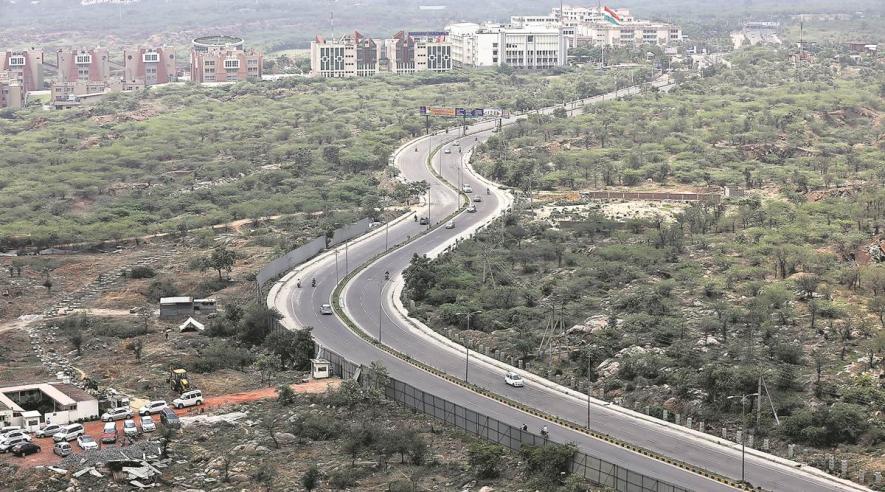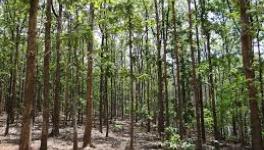How Centre is Deftly Bypassing Forest Conservation Rules for Highway Projects

Image for representational use only.Image Courtesy : The Indian Express
New Delhi: The National Democratic Alliance (NDA) government led by Prime Minister Narendra Modi has recently, in what appears to be a sleight of hand, sought to bypass forest conservation rules that are meant to compensate for lakhs of trees routinely felled during construction of highways.
Through a letter issued on June 30, the Bharatiya Janata Party-led NDA government has asked all state governments to undertake compensatory afforestation on ‘degraded’ forest land, while executing highway projects on behalf of the Central government, instead of scouting for non-forest land for the purpose.
The Forest Conservation Act, 1980, lays down that in case of diversion of forest land for non-forest activities, “compensatory afforestation shall be done over equivalent area of non-forest land”.
However, ‘degraded’ forest lands, over which afforestation will now take place, do not belong to the category of non-forest land. They are part of existing forest land, as per government records. Degraded forest lands are those that have lost their forest cover due to disturbances, such as natural calamities (flood, fire, etc.), excessive grazing, encroachments or other causes.
State government agencies, like the Public Works Department (PWD), while executing highway construction work on behalf of the Ministry of Road Transport and Highways or MoRTH, will now no longer enter their own name in the online application form for forest clearance. They will enter the name of MoRTH, which has the liberty to undertake afforestation on degraded forest lands. This will automatically bestow the MoRTH’s liberty upon state governments.
However, environmentalists are opposed to such an approach to ‘afforestation’.
“The principle of bringing an equivalent area of non-forest land under forest cover, whenever a certain parcel of forest land is diverted for any kind of infrastructure work, has been enshrined for the sake of maintaining ecological balance. It ensures that forest cover as a proportion of the total geographical area of the country remains the same. When you allow compensatory afforestation on degraded forest land, you are not seeking to restore that ecological balance. Instead, you are allowing plantations to be carried out in patches of existing forest land which have been degraded over a period of time for whatsoever reasons. Forests constitute natural infrastructure. It is impossible to artificially recreate natural ecosystems comprising forests, water bodies, flora and fauna and wildlife” said Debi Goenka, an environmentalist, who is Executive Trustee of the non-profit organisation, Conservation Action Trust.
The June 30 letter was issued by MoRTH, which is headed by Nitin Gadkari, a former president of BJP, following a meeting between the Director-General (Forests) in the Union Environment Ministry and Director-General (Roads) in the Union Road Transport Ministry.
“During the meeting, it was agreed by the DG (Roads) & SS that MoRTH will be entered as the ‘User Agency’ in the online application in PARIVESH for the diversion of forest land required for National Highway Project, which are developed and maintained by the Central Govt. but the execution is carried out by State Agency. As such, the dispensation of the compensatory afforestation over double the degraded forest land, instead of equivalent non-forest land will be available in such cases,” the letter states.
The Forest Conservation Act, 1980, makes a provision for using degraded forests for afforestation only under special circumstances. It states “where non-forest lands are not available or non-forest land is available in less extent to the forest area being diverted, compensatory afforestation may be carried out over degraded forest twice in extent to the area being diverted or to the difference between forest land being diverted and available non-forest land, as the case may be”.
But a state government’s plea that non-forest land is unavailable can be accepted by the Central government only on production of a certificate from the Chief Secretary concerned.
The MoRTH is exempt from this rule. It is allowed to undertake compensatory afforestation on degraded forest land on twice the area of forest land diverted. Through the June 30 letter, the MoRTH has sought to extend this exemption to state governments as well.
Experts say such exemptions will make it difficult to meet national forestry goals. The National Forest Policy, 1988 envisages bringing a minimum of one-third of the geographical area of the country, that is, 33%, under forest or tree cover.
The draft of a new National Forest Policy, which was unveiled in March 2018, also envisages bringing 33% of India’s geographical land under forest cover. However, as per the latest India State of Forest Report, released in December 2019, the total forest and tree cover of the country is 24.56% of total area.
“This figure is contestable, too, because the results are based on satellite imagery and not on ground surveys. The actual area under forest cover will be far lower. The target of meeting 33% will never be met if we continue diverting forest land without bringing in commensurate areas under tree cover,” added Goenka.
This, however, is not the first attempt by the BJP-led Central government to allow afforestation on degraded forest lands. In November 2017, the Union Ministry of Environment, Forests & Climate Change had issued a set of guidelines for states to identify land banks for compensatory afforestation. The ministry had set specific conditions for undertaking compensatory afforestation on degraded forest lands.
“The States and UTs shall create land bank for Compensatory Afforestation for speedy disposal of the FC proposals under FC Act, 1980. The degraded forest land with crown density upto 40% under the administrative control of forest department may be identified using the Satellite imagery and in consultation with Forest Survey of India and will be made available for CA for Central Government projects and Central Public Sector Units (CPSU),” stated the guideline.
As per experts, the proposal asking states to give degraded forest lands for compensatory afforestation is not legally tenable.
“Under the Forest Rights Act, 2006, all kinds of forests, whether degraded, reserved or revenue, are treated as community forest resources. Indigenous tribal communities have rights on these forests. The consent of the Gram Sabha concerned is a legal requirement to be ensured by the government before allocating any forest land. This position has also been established by the Supreme Court in the famous Niyamgiri case,” said Bhubaneshwar-based independent researcher, Tushar Dash.
The MoRTH has justified its action, ostensibly in a bid to expedite highway constructions that have been ‘unnecessarily delayed’. But it is not immediately clear if it was coerced into taking this action by certain private entities who are struggling to complete highway projects due to delays over forest clearances or litigations.
“Delays are not on account of rules. Neither are delays on account of litigations against violations of environmental norms. Projects get delayed due to systemic failures on the part of the government,” said Greater Noida-based environmental activist, Vikrant Tongad.
Gadkari, in a previous stint as PWD minister of Maharashtra, is known as a leader who was behind the successful completion of a number of highway and expressway projects across the state. Incidentally, Maharashtra, now ruled by a coalition between the Shiv Sena, the Nationalist Congress Party and the Congress, has sought a clarification on the letter from the Environment Ministry.
The writer is an independent journalist.
Get the latest reports & analysis with people's perspective on Protests, movements & deep analytical videos, discussions of the current affairs in your Telegram app. Subscribe to NewsClick's Telegram channel & get Real-Time updates on stories, as they get published on our website.























